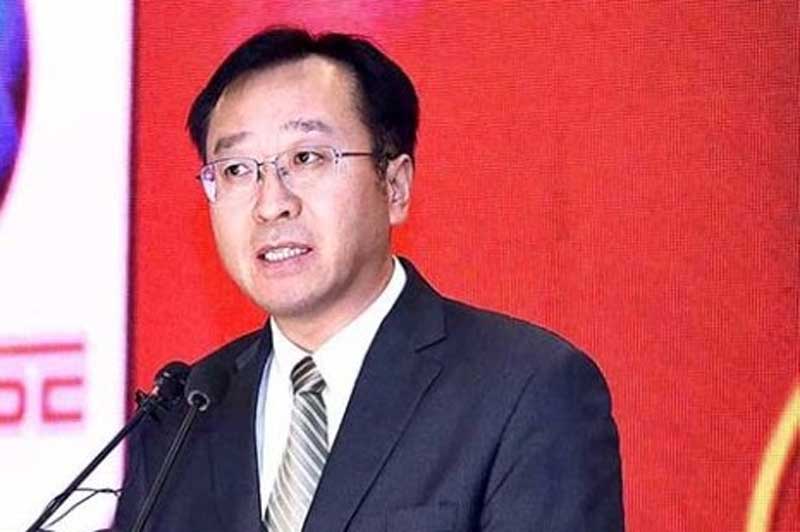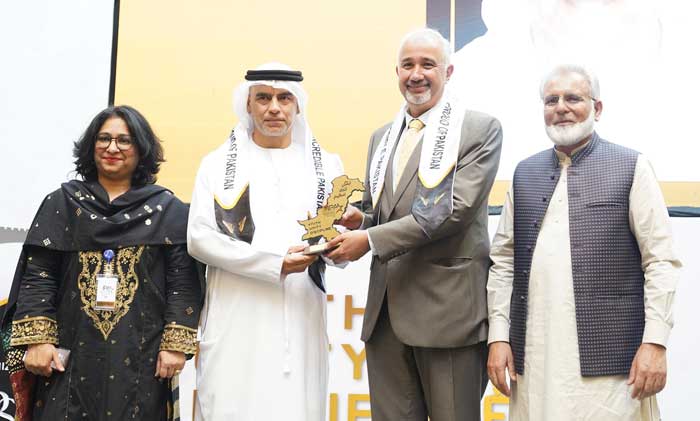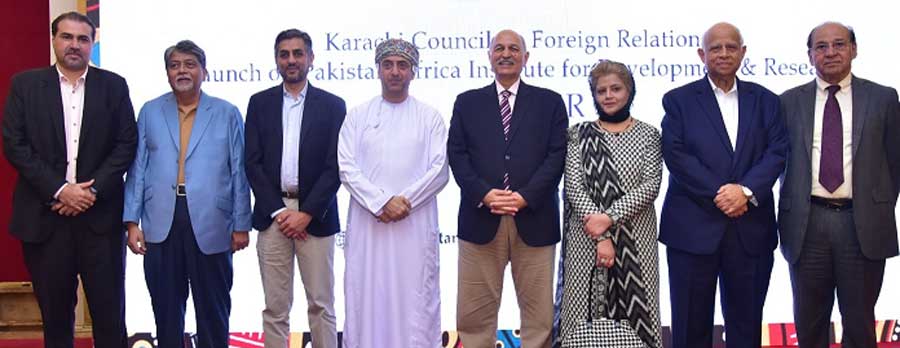
Chinese Consulate Karachi organized a seminar to celebrate 73 anniversary of China-Pakistan Diplomatic Relations. On this occasion various renowned personalities including Irfan Soomro, Hassan Habib, Dr. Junaid Ahmed, Syed Hassan Javed and Manzar Naqvi addressed the seminar.
Yundong Yang moderated all the ceremony beautifully and also addressed the seminar. Following the full text of his address.
Speech by Yundong Yang Consul General of China in Karachi at the Seminar in Celebration the 73rd Anniversary of Establishment of China-Pakistan Diplomatic Relation
At the Chinese Consulate Karachi
H. E. Irfan Soomro, Director General of Ministry of Foreign Affairs Liaison office, Karachi
Dear Ambassadors, dear friends from media, business and academia
Ladies and gentlemen, dear friends,
Good afternoon!
Welcome to the Consulate General. On May 21st, we will embrace the important moment of the 73rd anniversary of the establishment of diplomatic relations between China and Pakistan. Today we hold a seminar here in retrospect of original aspiration of establishing of diplomatic relations between our countries and forging ahead for a shared future.
China and Pakistan, as neighbors connected by mountains and rivers, are inseparable partners. Over 2,000 years ago, the ancient Silk Road intertwined the destinies of our two peoples. Pakistan was the first Islamic country to recognise the People’s Republic of China and formally establish diplomatic relations with the new China in 1951. Over the past 73 years, the relationship between China and Pakistan has forged ahead under the strategic guidance of leaders from both countries. Through the joint efforts of the governments and peoples of both nations, our comprehensive cooperation has flourished and solidified into an ‘ironclad’ friendship.
Friendship between China and Pakistan is based on trust and mutual support, and we have been devoted friends through both good and hard times. Despite changes in the domestic and international environment, we have always extended sympathy to and supported each other on issues crucial to our respective core interests.
At the critical times when New China endeavored to break the blockade, resume its lawful seat at the United Nations and explore ways to carry out reform and opening-up, Pakistan always came forward with selfless and valuable assistance.
Similarly, whenever Pakistan is in need, China has come to its help. China firmly supports Pakistan’s efforts to uphold sovereignty, independence and territorial integrity.
I would like to highlight some milestones of our bilateral relationship.
In October 1956, Pakistani Prime Minister Huseyn Shaheed Suhrawardy made an official visit to China at the invitation of the Chinese government. In December of the same year, Chinese Premier Zhou Enlai visited Pakistan, marking the first visit by Chinese Premier since the founding of the People’s Republic of China. The successful reciprocal visits by the two Prime Ministers within two months greatly promoted the development of bilateral relations and the friendship between the two peoples. In February 1964, Premier Zhou Enlai visited Pakistan for the second time and personally planted a sapling at Shakarparian Hills in Islamabad, symbolizing China-Pakistan friendship.
The Karakoram Highway, the world’s most beautiful cross-border highway built with China’s support and open to the public transportation in 1978, connects China and Pakistan. It is a lasting testimony of the friendship between the two countries. Approximately 700 individuals from both sides sacrificed their lives for this endeavor.
In 2015, Chinese President Xi Jinping made a historic visit to Pakistan, during which the leaders of both countries unanimously agreed to elevate China-Pakistan relations to an all-weather strategic cooperative partnership, which epitomizes the all-weather friendship and all-round cooperation between China and Pakistan. The China-Pakistan relationship has not only become a valuable strategic asset for both countries but also serves as a model of peaceful coexistence and mutually beneficial cooperation between nations with different social systems and cultural backgrounds.
Currently, China-Pakistan relations are operating at a high level and are faced with new opportunities for development, exhibiting vibrant vitality and vigor, primarily manifested in the following aspects:
Firstly, there is closer high-level exchanges. After the general election in Pakistan were concluded, President Xi Jinping, Premier Li Qiang and Chairman Zhao Leji of the National People Congress sent congratulatory messages to Pakistani leaders to extend their sincere congratulations and best wishes. Prime Minister Shahbaz Sharif expressed his anticipation for visiting China again during an interview with Xinhua News Agency. Recently, Pakistani Deputy Prime Minister and Foreign Minister Mohammad Ishaq Dar visited China and hold the fifth round of China-Pakistan Foreign Ministers’ Strategic Dialogue. Last year, President Xi Jinping’s special envoy and Vice Premier, He Lifeng, made a special trip to Pakistan to attend the celebration of the tenth anniversary of the launch of the CPEC. During the visit, He Lifeng met with Pakistani leaders to exchange in-depth views on deepening traditional friendship and expanding pragmatic cooperation. Now we are expecting more high level exchanges between the two countries.
Secondly, the fruitful results of mutually beneficial cooperation. Over the past 11 years, CPEC has brought a total of US $25.4 billion in direct investment, 236000 jobs, 510km of highways, more than 8000 megawatts of electricity and 886km of core transmission network. The construction of Gwadar Port is changing with each passing day. Lahore Orange Line introduces an era of metro train service for Pakistan. Power stations invested by Chines enterprises have lit up thousands of lights. Ceramic tiles produced with Chinese investment and expertise have entered thousands of households. Pakistani seafood, sesame, mango, citrus and nuts are increasingly entering the Chinese market. The aforementioned pragmatic cooperation has strongly promoted Pakistan’s economic and social development, bringing tangible benefits to the local people. Now we are working together to promote the high quality development of CPEC in the Second phase, which focus on cooperation in fields of agriculture, industry, mining, science and technology and people to people exchanges. The high quality development of CEPC will benefit Pakistan’s economic growth, improve the livelihood of Pakistan’s people, promote green development, cultivate more high tech industries.
Thirdly, diverse exchanges in humanities, science and technology. In recent years, cultural and people to people exchanges between China and Pakistan have continued to expand. Various groups, including think tank scholars, media personnel, and religious representatives, have been visiting each other, while the enthusiasm for student exchanges and studying abroad has been on the rise, along with the increasing demand for learning Chinese language. Last year was designated as the ”China-Pakistan Year of Tourism”, during which art exhibitions featuring Gandhara Art Exhibition were held successively in Beijing, Lanzhou, and Shenzhen, sparking a wave of exhibition enthusiasm. Not long ago, Pakistan’s first lunar probe, ICUBE-Q, was successfully launched alongside China’s Chang’e 6 at the Wenchang Space Launch Center, further expanding bilateral cooperation in the field of space exploration. This achievement has received widespread attention and warm welcome from various sectors of Pakistani society.
Fourthly, heartwarming mutual assistance and solidarity. After the Wenchuan earthquake in China in 2008 and at the onset of pandemic in 2020, Pakistan extended its full support to China by urgently dispatching tents and masks. Upon the production of COVID-19 vaccines in China, the country promptly provided assistance to Pakistan. In 2022, when Pakistan was hit by floods, China spared no effort in providing aid. During evacuation operations in Yemen and South Sudan, Chinese warships evacuated hundreds of Pakistani citizens, while Pakistani warships also assisted in the evacuation of numerous Chinese students. Chinese President Xi Jinping once said during his visit to Pakistan: “having gone through weal and woe together, we couldn’t feel more gratified to have each other as great neighbor and friend. ”
Fifthly, steadfast and robust international cooperation. China and Pakistan maintain close cooperation and coordination within frameworks such as the United Nations and the Shanghai Cooperation Organization. Both countries actively engage in trilateral foreign minister dialogues with Afghanistan. Pakistan, along with China, is committed to promoting the implementation of President Xi Jinping’s Global Development Initiative, Global Security Initiative and Global Civilization Initiative. Pakistan takes the lead in implementing these initiatives, jointly promoting the development of global governance towards a more just and equitable direction.
Ladies and gentlemen, friends,
Today, I would like to use this opportunity to brief you the background and Chinese position on the issue of Taiwan, which is at the core of China’s core interests. Over the past 73 years, Pakistan has steadfastly adhered to the one-China principle, firmly supporting the Chinese government’s efforts to achieve national reunification and opposing any form of ”Taiwan independence”. China highly appreciates Pakistan’s stance on this matter.
Taiwan has belonged to China since ancient times. The ancestors of most of the residents in Taiwan came from the mainland of China. Successive Chinese governments have established administrative institutions in Taiwan and exercised jurisdiction over it. After the Opium War in 1840, Western powers invaded China. In 1894, Japan launched the First Sino-Japanese War of aggression against China and forced the Qing government to cede Taiwan the following year. During the half-century of Japanese occupation of Taiwan, the Taiwanese people never ceased their resistance. In 1943, during the 2nd world war, the Cairo Declaration jointly issued by the governments of China, the United States and the United Kingdom clearly stated that Taiwan, which Japan had stolen from the Chinese, shall be restored to China. In 1945, the Potsdam Proclamation to end World War II reiterated that ”the terms of the Cairo Declaration shall be carried out.” In the same year, the Chinese government announced that it was resuming the exercise of sovereignty over Taiwan, thereby legally and factually recovering Taiwan. Although the two sides of the strait are in a long-term political confrontation, the fact that both the mainland and Taiwan belong to one China has never changed, and China’s sovereignty and territorial integrity have never been divided. The Taiwan question is entirely China’s internal affair. Taiwan has never been and will never be a country.
On Oct. 25, 1971, the 26th session of the UN General Assembly adopted Resolution 2758 with an overwhelming majority. It states in black and white that the General Assembly “decides to restore all its rights to the People’s Republic of China and to recognize the representatives of its Government as the only legitimate representatives of China to the United Nations. The Resolution resolved once and for all the question of the representation of the whole of China, including Taiwan, in the United Nations as a political, legal and procedural issue. It made clear that there is only one China in the world and that Taiwan is a part of China, not a country. From the first country to establish diplomatic relations with the People’s Republic of China, to the 183rd country, Nauru, all have politically committed to adhering to the one-China principle and have included it in their diplomatic documents such as joint communiqués and statements with China. They have all severed so-called “diplomatic” relations with Taiwan. This fully demonstrates that adhering to the one-China principle is in line with international justice, the will of the people, and the trend of the times.
Peaceful reunification and One Country, Two Systems are our basic principles for resolving the Taiwan question. National reunification by peaceful means is the first choice of the Chinese government in resolving the Taiwan question, as it best serves the interests of the Chinese nation as a whole. We are ready to create vast space for peaceful reunification; but we will leave no room for separatist activities in any form. We will strive for peaceful reunification with the utmost effort and greatest sincerity. In the meantime, our bottom line is also clear: we will absolutely not allow anyone to separate Taiwan from China in any way.
At present, the cross-Strait situation faces serious challenges. The challenge comes from “Taiwan independence” separatist activities and external disruptions. The Democratic Progressive Party (DPP) authorities have adopted a separatist stance, and colluded with external forces in successive provocative actions designed to divide the country. They have steadily built up their military forces with the intention of pursuing “independence” and preventing reunification by force, and employ various means to achieve so-called “diplomatic” breakthroughs serving the purpose of “Taiwan independence” and severely harm the fundamental interests of people in Taiwan, triggering strong dissatisfaction and firm opposition from both sides of the strait. The DPP authorities and certain country have been deliberately distorting and challenging UNGA Resolution 2758, trumpeting the notion that Taiwan’s status is undetermined, and advocating support for Taiwan’s participation in the United Nations multilateral forums, including The World Health Assembly?WHA?. These moves mislead international public opinion and challenge the one-China consensus among the international community. They trample on the international law and basic norms governing international relations, and seek to turn back the wheel of history. Such attempts will not succeed.
Completing reunification of our motherland is the shared aspiration of the people, the trend of the times and a historical inevitability, and no force can stop it. Any attempt to use the Taiwan question as a pretext to interfere in China’s internal affairs or obstruct China’s reunification will meet with the resolute opposition of the Chinese people, including our compatriots in Taiwan. No one should underestimate our resolve, will and ability to defend China’s sovereignty and territorial integrity.
Ladies and gentlemen, friends,
The Taiwan question is at the core of China’s core interests. Pakistan’s successive governments have consistently adhered to the One China principle and firmly supported China in safeguarding its core interests. In 1971, Pakistan co-sponsored UN General Assembly Resolution 2758, firmly supporting the restoration of the People’s Republic of China’s lawful rights in the United Nations, further consolidating the political foundation for bilateral exchanges. During meetings between leaders of Pakistan and China, including Presidents and Prime Ministers, supporting China in safeguarding its core interests, including Taiwan, has been a topic of discussion. Joint press releases and other political documents clearly state Pakistan’s firm adherence to the one-China principle. In August 2022, the Pakistani Ministry of Foreign Affairs issued a statement regarding the visit of U.S. House Speaker Nancy Pelosi to the Taiwan region of China, reaffirming Pakistan’s steadfast adherence to the one-China principle and firm support for China in safeguarding its national sovereignty and territorial integrity. Chinese people appreciate it so much.
China firmly believes that Pakistan will stay committed to the one-China principle and support the Chinese people’s just cause of opposing “Taiwan independence” separatist activities and striving for national reunification. China will ultimately achieve complete reunification, and Taiwan is bound to return to the embrace of the motherland.
We are willing to work together with all sectors of the consular area to firmly uphold the core interests of both countries, maintain close communication and exchange, strengthen pragmatic cooperation, promote the deepening and solidification of the all-weather strategic cooperative partnership between China and Pakistan, and jointly build a closer China-Pakistan community with a shared future in the new era.
Thank you, everyone!

Full text of Speech by Manzar Naqvi, Executive Editor The Financial Daily & Secretary General Karachi Editors Club
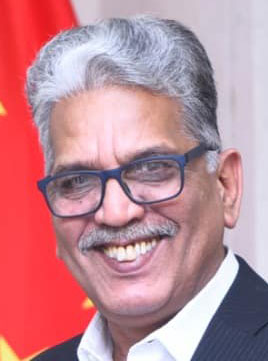
H.E. Mr Yundong Yang, the Consul General of the PRC
Mr Mubasher Mir, President Karachi Editors Club
Distinguished Guests
Ni Hao,
First and foremost, heartfelt congratulations to everyone gathered here today, as well as to the esteemed nations of China and Pakistan, marking the 73rd anniversary of their diplomatic relations.
I extend my gratitude to His Excellency Yundong Yang for providing me the opportunity to speak at this distinguished event hosted by the Chinese Consulate.
I commend the ongoing dedication of His Excellency Yundong Yang in fostering and enhancing the bond between Pakistan and China, Especially in ensuring the timely completion of the CPEC despite security challenges.
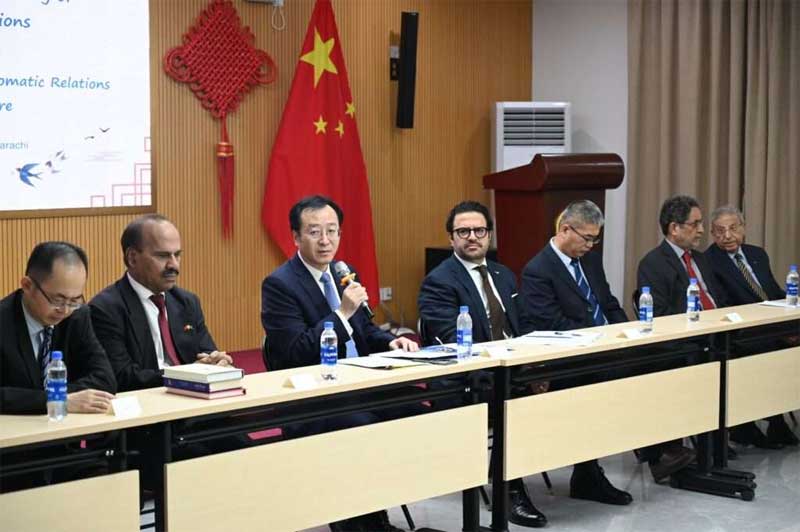
Today marks a significant occasion as we come together to honor the 73rd anniversary of the establishment of diplomatic relations between Pakistan and China. This momentous milestone underscores the enduring bond between our two nations and underscores the strength of our strategic partnership. Reflecting on the journey of friendship and collaboration spanning seven decades, it is crucial to recognize the pivotal roles both Pakistan and China have played in fostering regional stability, driving economic progress, and promoting global harmony.
As we commemorate our diplomatic ties, it is essential to address a pressing concern in the Asia-Pacific region – the Taiwan question. Pakistan firmly stands behind the One-China policy, which asserts that there is only one China and that Taiwan is an integral part of it. This is an indisputable fact supported by history and the law. Taiwan has never been a state; its status as part of China is unalterable.
Both Pakistan and China share a common perspective on the Taiwan question, grounded in mutual respect for sovereignty and territorial integrity. We advocate for the peaceful resolution of this question through dialogue and negotiations, in accordance with the principles enshrined in the United Nations Charter.
As a steadfast partner, Pakistan reaffirms its unwavering commitment to upholding the One-China policy and supporting China’s endeavors for peaceful reunification. We categorically oppose any actions that undermine China’s sovereignty and territorial integrity, including separatist activities in Taiwan.
Furthermore, we commend China’s dedication to maintaining peace and stability in the Taiwan Strait. We call upon all parties to exercise restraint, refrain from provocative actions, and work towards a peaceful resolution through constructive dialogue.
Taiwan’s historical and legal ties to China are undeniable, dating back to ancient times and supported by various historical records and international agreements. The Communist Party of China (CPC) has consistently pursued peaceful reunification efforts, emphasizing principles such as the one-China principle and the promotion of unity among Chinese people.
The CPC’s commitment to peaceful reunification is evident in its advocacy for the “One Country, Two Systems” framework, successfully implemented in Hong Kong and Macao. This framework offers Taiwan the opportunity to maintain its autonomy while reintegrating with the mainland. Despite challenges, the CPC remains dedicated to engaging with all stakeholders in Taiwan to facilitate reunification through dialogue and consultation.
The significance of reunification extends beyond historical and legal grounds. It is crucial for China’s national rejuvenation, ensuring stability, preventing external interference, and advancing national interests. We firmly oppose separatist forces in Taiwan, particularly the Democratic Progressive Party (DPP), for their attempts to undermine the one-China principle and obstruct cross-straits exchanges.
When other countries mess with Taiwan, it makes things worse in the area and makes tensions higher. Some people say the United States is one of the main culprits for getting involved in China’s business and using Taiwan to get ahead in politics. These moves don’t just go against the idea of one China, but they also put peace and stability at risk in the region.
While advocating for peaceful reunification, China reserves the right to use force if necessary to counter separatist activities or external interference.
The benefits of reunification are manifold, promising economic development, increased opportunities, and enhanced stability in the Asia-Pacific region. Moreover, peaceful reunification will contribute to global peace, stability, and development, benefiting not only China but the entire international community.
As a Pakistani, I reaffirm our steadfast support for the One-China policy and our commitment to strengthening the bonds of friendship and cooperation between Pakistan and China. Together, let us strive to build a more prosperous, peaceful, and harmonious world for future generations.
As we reflect on the achievements and challenges of the past 73 years, let us also look towards the future with optimism and determination. The friendship between Pakistan and China is not only based on shared interests but also on shared values of mutual respect, trust, and cooperation.
Moving forward, we must continue to deepen our bilateral ties, explore new avenues for collaboration, and address common challenges together. Whether it is in the fields of trade, investment, infrastructure development, or people-to-people exchanges, there is immense potential for us to further strengthen our partnership and create mutual benefits for our peoples.
Furthermore, as responsible members of the international community, Pakistan and China have a shared responsibility to contribute to global peace, stability, and prosperity. We must work together to address pressing global issues such as climate change, terrorism, poverty, and pandemics.
In this regard, the China-Pakistan Economic Corridor (CPEC) stands as a shining example of our cooperation and shared commitment to regional connectivity and economic development. By enhancing connectivity, promoting trade, and fostering people-to-people exchanges, CPEC has the potential to bring about transformative change not only for our two countries but for the entire region.
As we embark on the next chapter of our friendship, let us reaffirm our commitment to upholding the principles of sovereignty, equality, and mutual respect. Together, let us build a community of shared future for mankind, where all nations can thrive in peace and prosperity.
At the end, I would like to express my heartfelt gratitude to the government and people of China for their unwavering friendship and support. I am confident that our partnership will continue to flourish and contribute to the peace and prosperity of our two countries and the world at large.
Xie Xie.
Seventy-Three Years: A Timeless Bond of Pakistan-China Diplomatic Relations
Pakistan and China share a bond that goes beyond mere diplomacy. It’s a partnership rooted in mutual interests and shared aspirations for regional stability and economic prosperity

In the limelight of international relations, there exists a thread woven with the deepest hues of solidarity and trust. Pakistan and China, bound by an unbreakable bond, stand as testament to the enduring power of friendship amidst the tumult of global politics. From the towering peaks of the Himalayas to the bustling streets of Islamabad and Beijing, their diplomatic embrace echoes with the whispers of shared history and common aspirations.
Pakistan and China’s diplomatic journey, which commenced on the 21st of May 1951, has transcended time, evolving into a formidable alliance with each passing day and year. This cherished relationship, rooted in mutual recognition and respect, has blossomed into an All-Weather Strategic Cooperative Partnership, epitomizing the unwavering commitment of both nations’ leadership to propel it forward. Pakistan, among the first nations to embrace the People’s Republic of China, holds China dear as its Iron Brother, while China, in turn, cherishes Pakistan as one of its closest friends and partners. This deep-seated camaraderie is underpinned by feelings of mutual trust, respect, and goodwill, fostering a regular exchange of high-level visits and strategic consultations between the two neighbors. Economically, China’s stature as Pakistan’s largest trading partner and a major investor, particularly in infrastructure and energy sectors, amplifies the bilateral synergy. The official launch of the China-Pakistan Economic Corridor (CPEC), a flagship project under President Xi Jinping’s “One Road, One Belt” initiative, marks a significant milestone, elevating the bilateral relationship to unprecedented heights. CPEC, envisioned to enhance connectivity and infrastructure, has catalyzed monumental developments, fostering socio-economic prosperity and job creation across Pakistan. This transformative journey, facilitated by a robust mechanism of Joint Cooperation Committees and Working Groups, underscores the depth of commitment towards mutual progress and shared prosperity. As Pakistan and China continue to script a narrative of unparalleled friendship and cooperation, their enduring partnership serves as a beacon of hope, inspiring a more harmonious global community.
Pakistan’s diplomatic ties with China have stood the test of time, evolving into a robust alliance with multifaceted dimensions. Pakistan was one of the first countries to recognize the People’s Republic of China, their relationship has grown from strength to strength. Throughout the years, their partnership has become a cornerstone of regional stability and economic growth.
In the early years, the two nations established their camaraderie on the foundation of countering common threats and challenges. As the geopolitical landscape evolved, their alliance served as a strategic counterbalance to the influence of neighboring India. Moreover, China’s substantial investments in Pakistan’s infrastructure, including the transformative CPEC, have not only fueled Pakistan’s economic growth but have also deepened the bond between the two nations.
Over time, their collaboration expanded beyond economic ventures to encompass defense and security cooperation. With a shared commitment to combating terrorism and ensuring regional security, China and Pakistan have engaged in intelligence sharing and military exchanges. Pakistan’s pivotal role in China’s Belt and Road Initiative (BRI) further solidifies their partnership, with CPEC emerging as a flagship project under this ambitious endeavor.
Their friendship extends beyond bilateral interests, manifesting in unwavering diplomatic support in international forums. Through thick and thin, China and Pakistan have stood by each other, forging a bond based on trust, respect, and mutual benefit. As they continue to navigate the complexities of global politics, the China-Pakistan relationship remains a beacon of stability and cooperation in an ever-changing world.
– 1949: The People’s Republic of China was established.
– 1950: Pakistan becomes one of the first countries to recognize the People’s Republic of China.
– 1951: Diplomatic relations between Pakistan and China are formally established.
– 1962: The Sino-Indian War strengthens Pakistan’s ties with China as Pakistan supported China during the conflict.
– 1963: The Sino-Pakistani Agreement is signed, transferring territory from Pakistan-administered Kashmir to China.
– 1971: During the Bangladesh Liberation War, China supports Pakistan, leading to further strengthening of bilateral relations.
– 1978: China’s reform and opening-up policies begin, leading to increased economic cooperation between China and Pakistan.
– 2013: China announces the China-Pakistan Economic Corridor (CPEC) project, enhancing economic collaboration between the two countries.
– 2024: China and Pakistan celebrate the 73rd anniversary of the establishment of diplomatic relations, highlighting the strong and enduring friendship between the two nations.
These milestones highlight the close and strategic partnership that has developed between Pakistan and China over the years. Further developments in Pakistan-China relations include ongoing military cooperation, cultural exchanges, and economic collaborations. The CPEC has emerged as a flagship project, aiming to enhance connectivity and promote economic development in Pakistan. Both countries continue to support each other on various international platforms, maintaining a strong strategic partnership. People-to-people exchanges, educational cooperation, and mutual support on regional and global issues further cement the bond between Pakistan and China. The bilateral relationship between the two countries remains vital for regional stability and economic development in the broader context of South Asia and beyond.
Worth mentioning that Pakistan and China’s diplomatic relations have evolved into a multifaceted partnership with several key aspects driving their enduring bond. Firstly, their strategic partnership stands as a pillar of regional stability, with both nations collaborating closely on security, defense, and counterterrorism efforts. Secondly, economic cooperation forms a cornerstone of their relationship, with China emerging as a major investor in Pakistan’s infrastructure projects, notably through the CPEC. Additionally, military cooperation between the two countries is robust, encompassing joint exercises, technology transfer, and defense collaboration. Diplomatically, China consistently extends support to Pakistan on various international platforms, while Pakistan aligns itself with China on matters of mutual interest. Finally, people-to-people ties foster cultural exchanges, educational collaborations, and tourism, strengthening the bond between the peoples of both nations beyond official channels. As Pakistan and China celebrate the 73rd anniversary of their diplomatic relations, these five aspects underscore the depth and resilience of their friendship, which continues to shape the geopolitical landscape of the region. This relationship goes beyond mere strategic cooperation; it embodies a deep-rooted friendship that has weathered the tests of time and emerged stronger. Their partnership is characterized by a shared commitment to fostering peace, stability, and prosperity in the region. The bond also extends beyond bilateral interests, manifesting in a robust diplomatic support system in various international forums. Whether it’s advocating for each other’s positions on critical issues or standing shoulder to shoulder in times of global challenges, the two countries exemplify the true essence of solidarity and collaboration. At its core, the friendship between Pakistan and China is built on a foundation of trust, respect, and mutual benefit. This symbiotic relationship allows both nations to leverage their respective strengths and resources for collective advancement. From infrastructure development projects like BRI & CPEC to joint military exercises, their collaboration spans across diverse sectors of mutual interest. In an ever-evolving geopolitical landscape, the enduring friendship between China and Pakistan serves as a beacon of stability and cooperation. As both countries navigate complex global challenges and opportunities, their shared commitment to each other highlights the importance of fostering genuine relationships in the realm of international politics. By continuing to stand by each other through thick and thin, China and Pakistan set a commendable example for the world on how genuine friendship can transcend borders and contribute to a more harmonious global community.
As we reflect on the remarkable journey of Pakistan-China diplomatic relations, spanning over seven decades, it becomes evident that the bond between these two nations is not merely defined by geography or shared interests, but by the enduring spirit of friendship and cooperation. With a border stretching over 5000 kilometers, their relationship stands taller than the mighty Himalayas, symbolizing the strength and resilience that characterize their partnership. Like the sweetness of honey, their relations are imbued with warmth and sincerity, transcending borders and cultural differences. As the old saying goes, “Iron brothers” indeed, their bond is unbreakable, and their commitment to each other unwavering. Through thick and thin, Pakistan and China have stood by each other, and their friendship will last forever, ever, a testament to the power of genuine camaraderie in shaping a brighter future for generations to come.
The writer is a foreign affairs commentator and Secretary General of the Pakistan China Friendship Association’s Khyber Pakhtunkhwa chapter. He can be reached at: syeed.gilani@gmail.com.


